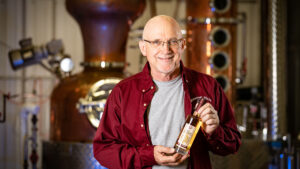 Nestled on the Missouri State University-Mountain Grove campus is the Missouri State Winery and Distillery. It’s a licensed, award-winning facility.
Nestled on the Missouri State University-Mountain Grove campus is the Missouri State Winery and Distillery. It’s a licensed, award-winning facility.
One man whose dedication and expertise have advanced the facility’s operations is Dr. Karl Wilker. He serves as manager, winemaker, and distiller. He’s also a research professor at the Darr College of Agriculture. The college houses the winery and distillery, which is part of the Missouri State Fruit Experiment Station.
Creating commercial wines
During his horticulture Ph.D. program in the 1980s, Wilker immersed himself in winemaking. It grew into a passion.
For more than a decade now, this passion drives him to develop the best wines possible at MSU. He uses grapes grown at the Fruit Experiment Station.
“Before I took over the winemaking, we were making port only. So, I started taking all the varieties of grapes we grew and making different types of wine,” Wilker said.
Among the wines currently produced and sold include Chambourcin (a French-American hybrid), Cynthiana (dry red), Norton (Missouri’s state grape), Pink Catawba (sweet blush), and White Blend (crisp white).
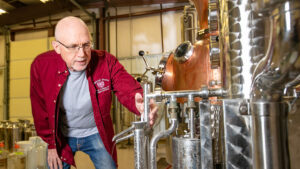 “I LIKE THE CHALLENGE OF DOING THINGS TO A HIGH-QUALITY LEVEL, AND CONTINUOUSLY LEARNING AND ADVANCING.”
“I LIKE THE CHALLENGE OF DOING THINGS TO A HIGH-QUALITY LEVEL, AND CONTINUOUSLY LEARNING AND ADVANCING.”
To make high-quality wines, Wilker applies the science of chemistry, fermentation, food processing, and microbiology. But ultimately, it comes down to smell and taste. Wilker relies on his experience of tasting many types of wines, and his sensory skills honed through the years.
“You have to try a lot of different products and emulate the best ones,” Wilker said. “The process is very sensory guided. You have to get a feel for what quality is.”
Experimenting with rum
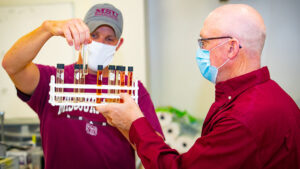 Besides winemaking, Wilker also focuses on distilling. In recent years, he has made rum in the distillery. He mixes molasses with water and leaves the mixture to ferment and distill. The resulting rum rests in oak barrels and aged for about two years.
Besides winemaking, Wilker also focuses on distilling. In recent years, he has made rum in the distillery. He mixes molasses with water and leaves the mixture to ferment and distill. The resulting rum rests in oak barrels and aged for about two years.
How does Wilker know when the rum is ready?
“I taste and keep tasting. I have an idea of the average time it should take, but each barrel has a different fermentation and composition,” he explained. “The quality of the final product is the result of many decisions and actions during its production.”
Dr. Wenping Qiu is Wilker’s colleague in the college who researches grape genetics. He believes Wilker has taken the university’s winery and distillery to the next level.
“Dr. Wilker doesn’t hesitate to try new methods in producing new styles of wine or spirits,” Qiu said. “He adjusts every detail in winemaking to make high-quality wines and has revived the distillation operation for commercial production.”
Racking up awards
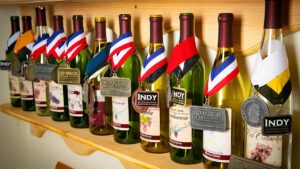
In 2007, Wilker led efforts to enter Missouri State’s wines and spirits into competitions.
“I saw it as a way for us to show what was going on here and evaluate what we’re doing,” Wilker said.
Since then, he and his team have won 60-plus awards from competitions across the country. These include the Jefferson Invitational Wine Competition, Mid-American Wine Competition, and New York World Wine & Spirits Competition.
“IF YOU DON’T HAVE A FEEL FOR WHAT QUALITY IS, IT’S REALLY HARD TO GET ANYWHERE BECAUSE THAT GUIDES EVERYTHING WE DO HERE.”
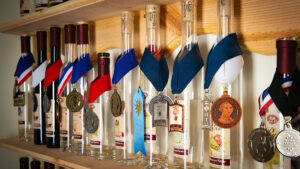
Two of the top awards won are the Jefferson Cup Trophy (2019 and 2016) and Sweepstakes winner (2016 and 2014). Rum took home the first award for 2020 – a silver at the San Francisco World Spirits Competition.
Sharing his expertise
 In his role, Wilker imparts his knowledge and skills to community members. Over the years, he has led or co-presented more than 30 workshops. They range from home winemaking to wine tasting and distillation.
In his role, Wilker imparts his knowledge and skills to community members. Over the years, he has led or co-presented more than 30 workshops. They range from home winemaking to wine tasting and distillation.
Wilker also supports grapes genetics research – like Qiu’s. He takes the new varieties of grapes and turns them into commercial bottled wines.
“It’s a good test for the grapes to see if they survive the winemaking process,” Wilker said. “Dr. Qiu’s team can then evaluate the quality of the wine and show it to people in the industry.”
He added that so far, he has worked with two new varieties, a white grape since 2016 and a red one from 2019. The former looks promising.
“If we don’t have someone like Dr. Wilker who makes wines out of new grapes, we can’t release new grape varieties,” Qiu said.
